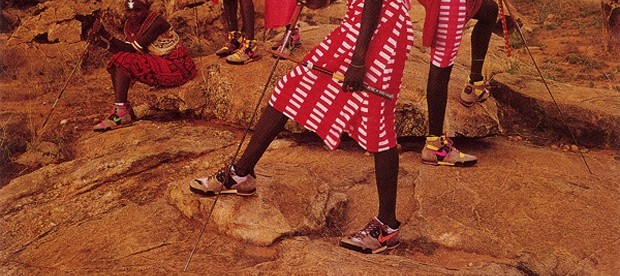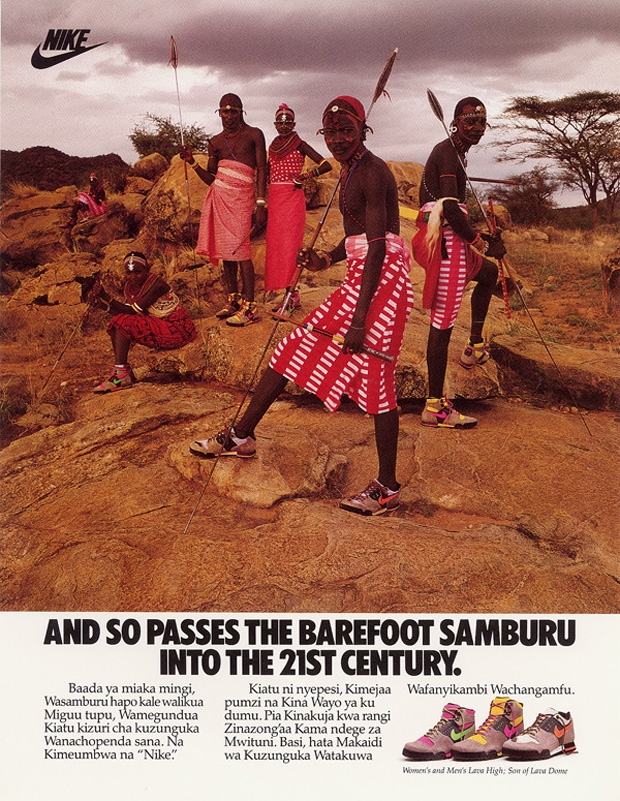Swooshed in Translation

In 1989, Nike embarked on an advertising campaign showing various people from around the world, each group now wearing Nike sneakers. In the print ads, like the one seen below, the story of each group of people is told in their native language or one geographically relevant. For example, the ad below features the Samburu people, a tribe of nomadic cattle herders in northern Kenya who previously hiked their foothills barefoot. The text below the ad (larger version here) is in Swahili. To give you an idea of how the ad campaign worked, the first paragraph of the ad translates, roughly, to “After many years, the ancient barefoot Samburu people have found shoes which their hearts desire. It’s called ‘Nike.'”

The ad above is fine — there nothing really all that interesting about it, at least not as far as trivia publications like this one are concerned. The only thing strange is that the Samburu don’t speak Swahili. They speak an eponymous language called Samburu, which is related to another language called Maasai, which linguistically isn’t related too closely to Swahili. But you can forgive Nike for the decision to use Swahili here. There are only about a million speakers of Maasai — not even Google Translate bothers to offer it as an option — and there are even fewer (about 250,000) speakers of Samburu. Translating Samburu into English or vice versa isn’t so easy.In fact, Nike learned that the hard way.
The print ad above also had a television ad which went with it. The TV ad, per the New York Times, was one for hiking shoes, filmed on location in Kenya and featuring Samburu tribesmen just like in the ad above (and perhaps some of the same people). The video is not online, but the Times describes it as follows:
It combines broad shots of brightly clad, dancing men and women, and close-ups of the colorful new boots. There are no words until the very end. Then the camera closes in on the one tribesman who speaks, in native Maa [actually Samburu, but close enough]. As he speaks, the Nike slogan, ”Just do it,” appears on the screen.
Time Magazine gives us a bit more information: the words spoken by the tribesman were “Mayieu kuna. Ijooki inamuk sapukin.” Again, Google Translate can’t help us there — see below — but Nike helpfully overlaid the words “Just do it” for us, implying that “Mayieu kuna. Ijooki inamuk sapukin” translates, loosely, to the famous Nike slogan.
Except… it doesn’t.
As the Los Angeles Times reported, the ad caught the attention of Dr. Lee Cronk, an anthropologist at the University of Cincinnati. Cronk had spent two years living with and studying the Samburu people, learning about them, their culture — and their language. He was one of perhaps a few dozen people who lived in the broadcast areas of the advertisement and spoke Samburu, and therefore, he was one of the few people who immediately knew that the tribesman hadn’t simply translated “Just do it” into his Samburu. “What he is really saying,” Cronk told the Times, “is, ‘I don’t want these. Give me big shoes.'”
Oops.
The director of the advertisement, per Snopes, attributed the error to the obvious language barrier; saying that they “never really knew what the tribesmen were saying” but put it in the ad anyway. But the official story is a bit different (although not necessarily the true story). Per the aforementioned New York Times article, the mistake wasn’t an oversight. Nike knew that its production team “improvised after having trouble getting a Maa version of the slogan.” (Basically, they claimed, “Just do it” doesn’t translate to Maa or Samburu very well.) So instead, Nike went with what they had. Through a spokesperson, the company stated “we thought nobody in America would know what he said.”
Whether the man ever got big shoes went unreported.
Bonus Fact: On January 17, 1977, Nike’s slogan was born — the company just didn’t know it yet. On that day, a man named Gary Gilmore was executed by the state of Utah by firing squad. When asked if he had any last words, Gilmore replied with “Let’s do it.” Dan Weiden, one of the co-founders of Weiden+Kennedy, Nike’s ad agency at the time, was the man who came up with “Just do it” few years later. He credited Gilmore’s quip as the inspiration for Nike’s slogan.
From the Archives: When the Cows Come Home: A beautiful gesture from the Maasai people to the United States, post-9/11.
Take the Quiz: Nike or Adidas?
Related: A Samburu spear for those who want to practice their spear throwing. (Seriously, that’s what it’s made for.)
